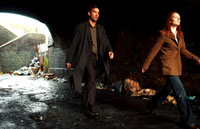

|
As soon as you're thrown into the rain slashed, desolute streets of a future London, a vivid dystopia opens up, but one you can see is just a step away from today. The first scenerio put to you in the opening sequence is that it's 2027 and the human race has stopped reproducing - women can't have babies anymore - and the youngest person alive is eighteen. No reason is given, but you're left to ponder the bio-hazards, diseases or mutations which may have led to this. Then as the film moves forward it's obvious that much of the totalitarianism which has marked the current UK Govt has been wound up a few more notches, and refugees are all being locked up, and very publicly - train stations hold cages of them. The overwhelming feeling is that not just society, but the entire human race itself, is really grinding to a pitiful halt - and it looks it: half of all humanity is rattling in cages, hi-tech cars whizz past but are all battered and grimy, every wall is a mess of old graffiti, animated advertising billboards blink out onto the grey streets, and sullen Londoners file past scared of the next 'terrorist' explosion. The plot centres around a pro-refugee revolutionary 'terrorist' group called the Fishes who have stumbled on an incredible discovery: amongst the hiding refugees is a woman who is infact pregnant, and most of the film follows efforts to take this woman to the coast to board a ship to take her to a safe haven. We won't spoil the plot anymore. This film goes much further than this main story, and plenty of other background features which make this such a well fleshed out scenerio. Michael Caine plays an ageing peace campaigner, cartoonist and stoner - with evidence in his house of being an old anti-Iraq war campaigner, and in many ways this character gives us a direct link between today and the future - he is one of today's activists, but now aged. Poignant scenes which really give the plot context include the derelict school (because there isn't any kids) and the refugee detention centre at Bexhill, which is literally an international third-world slum on British soil stuck behind razorwire. One criticism is that the revolutionary group the 'Fishes' are presented as being mostly corrupt and raving mad, as though it is inevitable that such underground anarchist resistance will always be chaotic and ineffective. It's as though the choice is to either join this crazed insurgency, or mong out in a hideaway retreat smoking strong grass with Michael Caine's character. In other words you don't meet many resistance fighters or activists who are particularly sorted. This film (and the novel by PD James) is one British dystopia to match the best of them - but while Orwell's 1984 was based around the postwar ration era and the spectre of Stalinist authoritarianism, this one is thoroughly reflective of today's malaise of an imploding globalisation and environmental meltdown, where medical science can no longer answer the new diseases technology throws up, and half the planet's population is refugee diaspora, running from war and catastrophe. It's another future where the bomb didn't wipe us all out - but instead it's a slow, painful death.
|
|
SchNEWS, PO Box 2600, Brighton, BN2 0EF, England Phone +44 (0)1273 685913 email: schnews@brighton.co.uk @nti copyright - information for action - copy and distribute |
|
 CHILDREN
OF MEN
CHILDREN
OF MEN